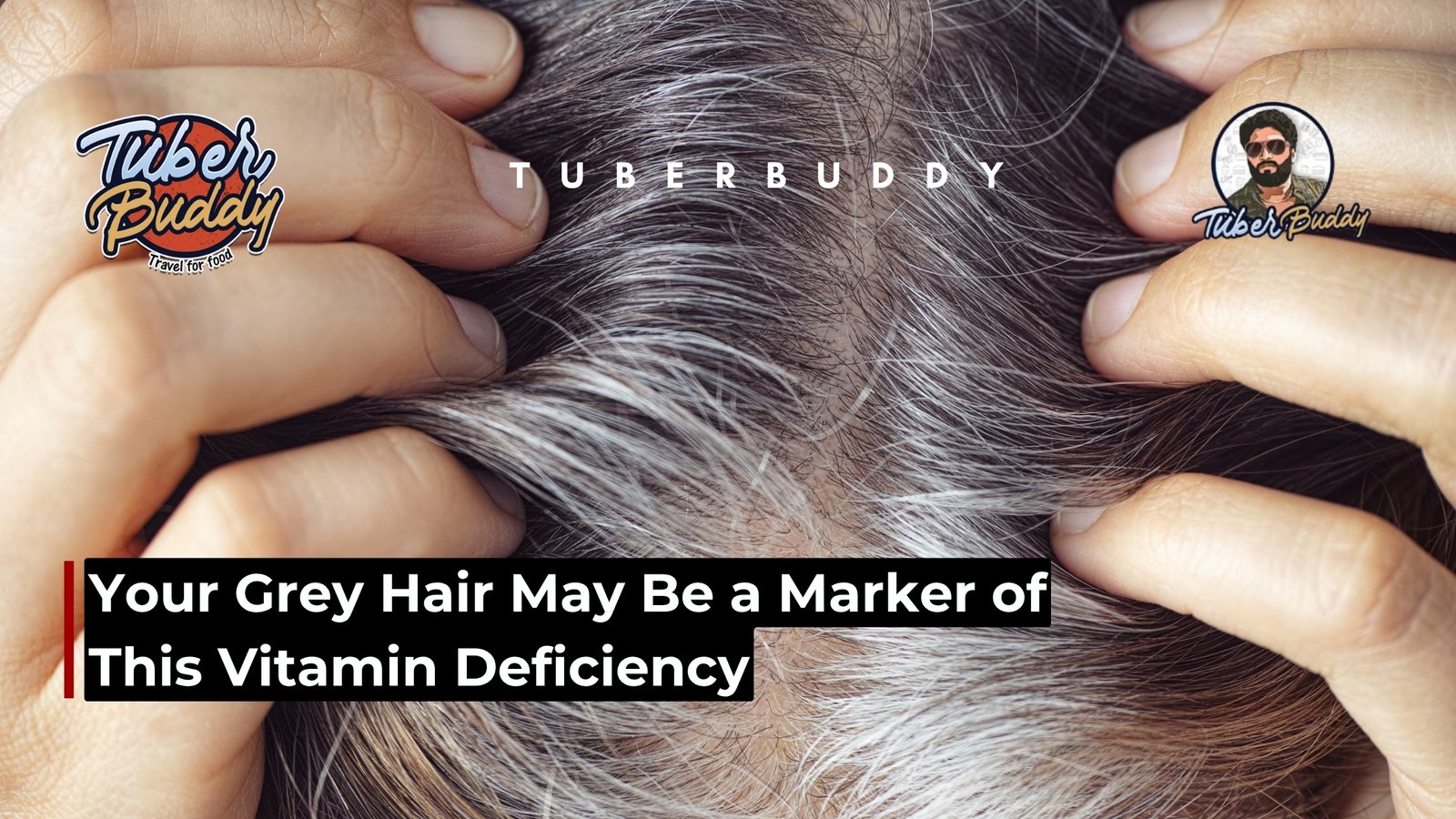Your Grey Hair May Be a Marker of This Vitamin Deficiency

Did you get a glimpse of a few silver hairs in your hair and wonder, “Am I already old?” Don’t worry, don’t panic, you’re not alone! The majority of people start seeing greyness at a younger age than you can even think of — even at their 20s or 30s. Although your genes play a major role, there is one sneaky enemy that most people ignore: vitamin deficiency.
Gray hair isn’t just a sign of aging — it can be your body yelling, “Hey, feed me something!” Let’s take a look at what’s happening in your head and how you can do something about it naturally.
Why Does Hair Turn Grey
Our natural colour is provided by melanin, which is a pigment formed by skilled cells called melanocytes in the hair follicles. As age advances, the cells reduce the creation of melanin slowly and thus form white or grey hair.
But if there is premature greying — that is, before the age of 35 — then it’s premature greying, and the first suspect is generally a deficiency of a vitamin. Vitamins and minerals provide fuel for melanin production, guard follicles against damage, and help hair to be healthy, wholesome-looking.
Below are some of the most prevalent deficiencies that can be fingered by your hair’s premature silvery hue.
1.Vitamin B12 Deficiency – The Culprit-in-Chief
It’s one of the most common reasons your locks don’t get enough Vitamin B12.
B12 is responsible for creating red blood cells and oxygenating your follicles. Your follicles are damaged in low amounts, and melanin production is curbed — resulting in those unwanted greys.
Signs and symptoms of B12 deficiency:
- Chronic weakness or tiredness
- Whitish or yellowish colour
- Dizziness or shortness of breath
- Numbness in toes and fingers
Food sources rich in Vitamin B12:
- Dairy and egg
- Fish (tuna, salmon, sardines)
- Chicken and red meat
- Fortified cereals (vegetarian)
Tip: If you are vegetarian or vegan, have B12 supplements after consulting your doctor.
2.Vitamin D3 – The Sunshine Vitamin
Low Vitamin D3 levels also contribute to your hair color, you see?
It is the Vitamin D which makes new hair follicles grow. Without Vitamin D, thinning of the existing ones occurs and melanin production gets disrupted.
How to boost Vitamin D
- Have 15–20 minutes of sun daily
- Eat fatty fish, fortified milk, and egg yolks
- Supplement when decreased sun exposure affects you
Wow fact: Individuals living in colder climates are more likely to be Vitamin D3 deficient — and early hair greying as well!
3.Biotin (Vitamin B7) – The Hair Growth Superhero
Biotin is also called the “beauty vitamin” since it is used to feed healthy hair, skin, and nails. It causes hair to become thin and turn white if the body doesn’t have it.
Food Sources of Biotin:
- Nuts (almonds, walnuts)
- Seeds (sunflower, flaxseed)
- Sweet potatoes
- Whole grains
- Bananas
Tip: Pair food high in biotin with good fats so that the absorption is given an extra boost.
4.Iron and Copper – Unsung Heroes
Iron supplies oxygen to hair roots, while copper aids in melanin formation. Without them, your hair color will deteriorate more quickly.
Iron-rich foods:
- Leafy greens (spinach, kale)
- Lentils, chickpeas, and beans
- Red meat
Copper-rich foods:
- Cashews
- Shellfish
- Mushrooms
- Dark chocolate
5.Folate (Vitamin B9)
Folate works in concert with B12 to form red blood cells and provide good coloring of the hair. Without enough folate, hair is weak, pale, and lackluster.
Foods that have folate:
- Fruits such as citrus
- Leafy green vegetables (broccoli, asparagus)
- Avocados
- Lentils
Try These Natural Fixes:
Eat a Rainbow: Consume coloured fruits and veggies packed with antioxidants.
Use Coconut Oil with Curry Leaves: Ancient time treatment gives hair roots a feed.
Amla (Indian Gooseberry): Vitamin C-rich ingredient, which initiates pigmentation.
Don’t Smoke and Stress: Both accelerate oxidative damage of follicles.
Drink Water: Water is responsible for nutrient delivery as well as maintenance of scalp.
Remember: Patience, people. Hair takes months to show inner change, and patience is the key, thus.
When to Consult a doctor
If your white hair is accompanied by:
- Hair fall or thinning
- Chronic fatigue
- Numbness of the nerves or dizziness
- Imbalanced diet or Gastro problem then consult a doctor or dermatologist. He/She will
- refer you for a blood test to check your vitamin B12, D3, iron, and folate.
Prevention is Better Than Cure
Even though you can’t do anything about your genes, at least you can manage your lifestyle and food.
Good Hair Habits to Have
Eat well-nourished, balanced food with vitamins and minerals
Sleep well — your body will regrow hair cells at night
Massage your scalp daily to have blood flowing through
Don’t colour your hair too often and stay away from chemical colourings
Be optimistic — worry is one of greying’s biggest silent attackers
Grey hair’s something you’d typically expect with age — and that isn’t anything to worry about. But if it’s premature, don’t dismiss it. Your hair may be hinting that your body’s warning you to get on with something with a vitamin imbalance.
By nourishing your body from the inside out with the right foods — i.e., Vitamin B12, D3, Biotin, Iron, and Folate — you can not only stop premature greying, but enhance your energy, mood, and overall well-being.
The next time you catch a glimpse of a grey hair glaring back at you in the mirror, smile and say, “Thanks, body — message received!”
For more stories that connect past and present, Follow Tuber buddy
